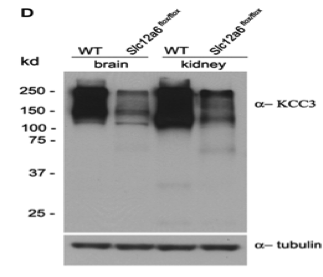This is a knockout-examined antibody summary, based on the publication "Loss of neuronal potassium/chloride cotransporter 3 (KCC3) is responsible for the degenerative phenotype in a conditional mouse model of hereditary motor and sensory neuropathy associated with agenesis of the corpus callosum", as cited below [1]. Labome curates formal publications to compile a list of antibodies with unambiguous specificity within Validated Antibody Database (VAD).
Company is Abnova.
SLC12A6 mouse polyclonal antibody (A01).
Catalogue No: H00009990-A01.
SLC12A6 polyclonal antibody (A01) from Abnova was used in Western blot experiments [1]. Western blot analysis of brain and Kidney lysates from Slc12a6flox/flox mice (tissue specific deletion of exon 18), probed with this antibody, showed 80 –85% lower KCC3 (encoded by the SLC12A6 gene) expression levels in Slc12a6flox/flox mice compared to Slc12a6+/+ mice.
In addition Western blot immunodetection in brain lysates from ubiquitous KCC3-null mice (Slc12a618/18) showed reduced KCC3 levels.

Western Blot
Tissue homogenates
C57Bl/6 Mice
Antibody concentration is 1:1000
KCC3 expression was significantly reduced in Slc12a6flox/flox mice (see figure 1).
- Shekarabi M, Moldrich R, Rasheed S, Salin-Cantegrel A, Laganiere J, Rochefort D, et al. Loss of neuronal potassium/chloride cotransporter 3 (KCC3) is responsible for the degenerative phenotype in a conditional mouse model of hereditary motor and sensory neuropathy associated with agenesis of the corpus callosum. J Neurosci. 2012;32:3865-76 pubmed publisher
- If you are aware of any publication with knockout studies validating a monoclonal or recombinant antibody, either purchased from any supplier or developed by the author(s), please notify us through feedback.
- gene
